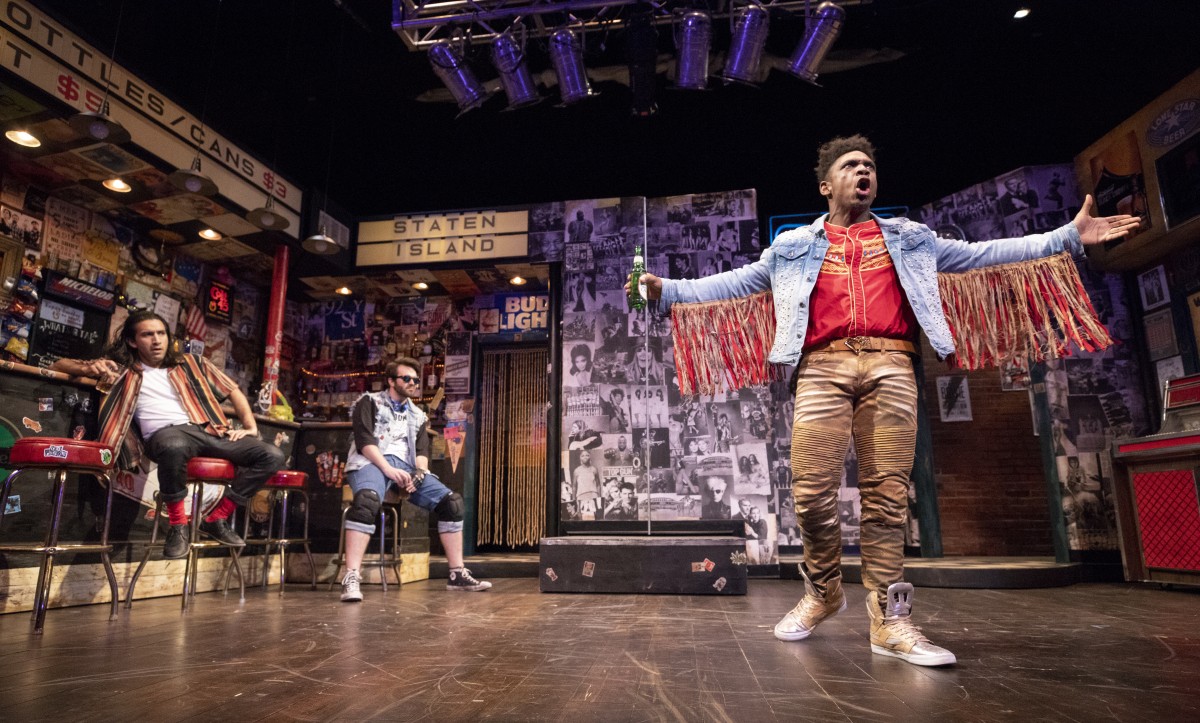It is apparently possible to find dopey grins on melted faces.
This unappetizing but not unpleasant sight can be found in the audience throughout Airness, Chelsea Marcantel’s chipper survey of the ups, downs and (in the case of phantom windmill power chords) counterclockwises within the competitive air guitar scene.
Marcantel and her director, Joshua Kahan Brody, have populated the Bratton stage with the same sort of schlubby music nerds familiar from “High Fidelity” and “School of Rock” and a zillion other stories, self-consciously swaggering their way through a world where names like Hendrix, Satriani and Malmsteen need no further explanation. (Speaking of explanations, “melting faces” is a sign of playing sufficiently ferocious heavy metal guitar. It’s a compliment, in other words.)
But despite the competitive setting, Airness — the title refers to the ineffable sensation of transcending the mere mechanics of playing a nonexistent musical instrument — goes easy on the backstage backstabbing. With the exception of the condescending champion, David “D Vicious” Cooper (Jake Lozano), everyone pretty much supports one another on and off the stage.
Instead, the drama manifests in the other five musicians’ attempts to match their 60-second musical snippets to their own personalities. Marcantel’s writing is at its sharpest when she dives into the minutiae of these songs and their meanings, as when Ed “Shreddy Eddy” Leary (James Smart) explains his bone-deep allegiance to “I Don’t Want to Grow Up,” the Ramones’ paean to arrested development. (But then why does she use rock critic Lester Bangs, perhaps the leading proselytizer for the sort of scuzzy, shambolic glories exemplifi ed by the Ramones, as a pejorative earlier in the play?) And I’ll be damned if I didn’t almost mist up at the sight of Mark “Facebender” Lender (David Rosenberg) switching his material from Lynyrd Skynyrd to Queen.
These choices can also be tactical, though: As in the recent wrestling-themed play The Elaborate Entrance of Chad Deity, the air guitarists’ alter egos can give some insight into what they want to present to the world — or, just as important, what they think the audiences and judges think they want to present to the world. When the audience’s surrogate, a tentative newbie named Nina O’Neal (a sympathetic Jerrie Johnson), adopts simply “The Nina” as her persona, it is both a sign of her skittishness and her awareness that The Nina might help the real Nina become a better Nina.
William Boles’ suitably dingy set serves as an endless stream of bars that host the regional “qualifiers” for the U.S. Air Guitar Championships. Yes, that’s a real organization, with a logo and rules and everything.
Marcantel got permission to use all of these things — and also retained the services of the reigning real-life U.S. air guitar champion, an over-caffeinated ectomorph named Matt “Airistotle” Burns, to offer extensive air guitar training during rehearsals. (He also plays several smaller roles in the piece. In keeping with the sense of charity and support that Marcantel preaches, this review will focus on Airistotle’s air guitar training. His air guitar training was very good.)
“This all might be pretend, but it’s serious pretend,” says Gabe “Golden Thunder” Partridge (a delightful Elijah Jones), whose socially conscious routines include taking off some clothes and then miming the Confederates’ surrender at Appomattox and then taking off some more clothes. This sentiment comes fairly close to the essence of theater, and Airness is at its strongest when it demonstrates the seriousness of silliness and vice versa.
Even with the fairly tight running time, Airness still runs aground during a fairly typical love triangle between D Vicious, The Nina and the self-aware Astrid “Cannibal Queen” Anderson (a ferociously committed Octavia Chavez-Richmond). The story tends to flag when these machinations shift to the forefront, and the same is true of the characters’ extensive parsing of the sensation of “airness,” which is basically the same sort of artistic transcendence one hopes for in any performance, including ones with actual instruments. The final consensus appears to be that you just kind of know airness when you see it.
So why waste your and our time yammering about it, or about who broke up with who and when? These faces out here aren’t going to melt themselves.
Eric Grode is the director of the Goldring Arts Journalism Program at Syracuse University, the author of The Book of Broadway (which recently had a second printing) and a regular freelance theater contributor to The New York Times.










